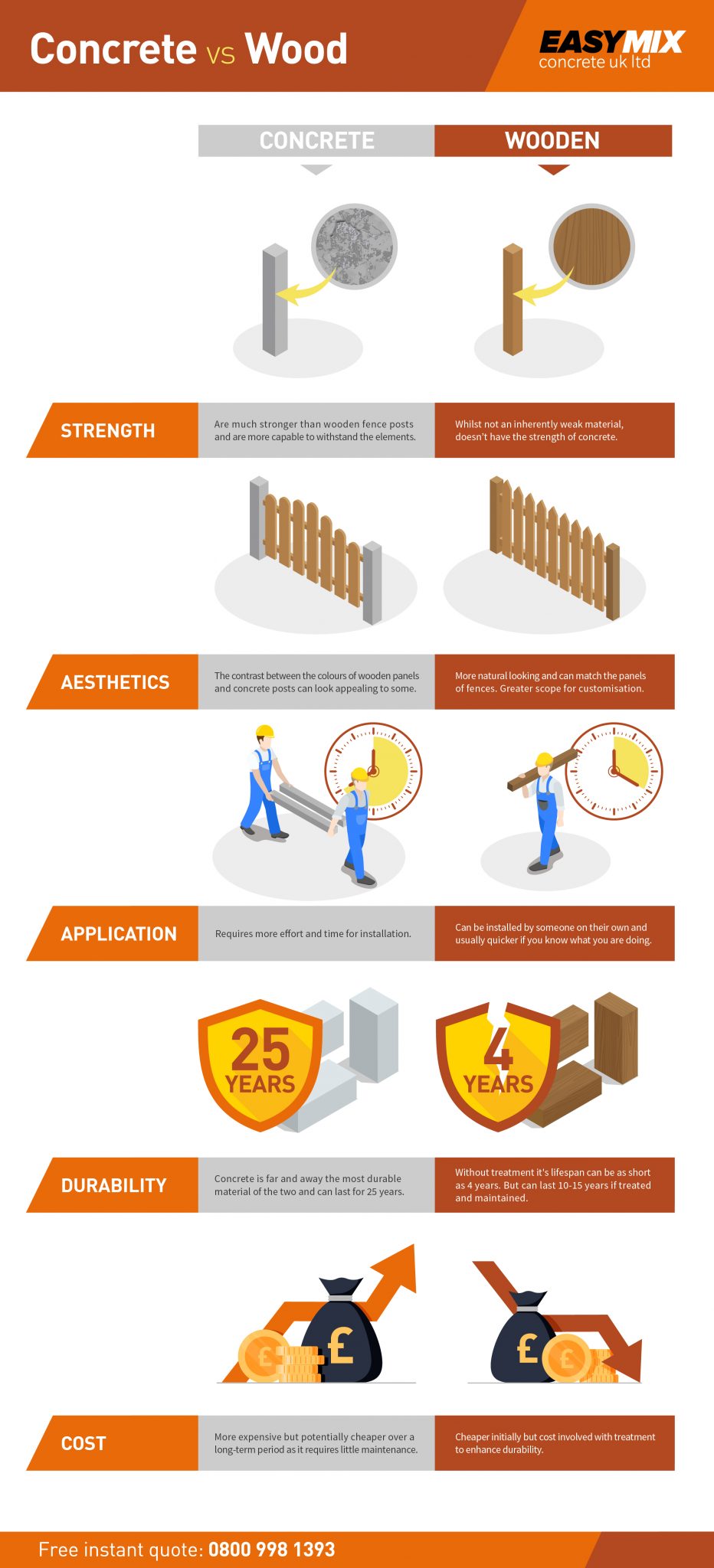
If you’re thinking of installing a fence on your property, then you have a lot to consider, particularly what kind of fence posts you’re going to opt for. If the fence is to be purely decorative, or if it’s going to serve as a partition or border, this can have a bearing on what material would suit your needs the best. There are plenty of things to consider when it comes to getting a new fence, and in this piece, EasyMix are going to run through the benefits of concrete fence posts when compared to wooden ones.
Strength
Concrete will last for a long, long time without any maintenance. It can be susceptible to damage from the elements, but even this will take a while. Wood, on the other hand can have a comparatively short lifespan if it’s not treated properly – rot can set in, which means you’ll have to pay to replace the affected fence post(s). Even if the wood is treated, it will last for around 10-15 years at best, which is still some way short of concrete’s 20-25 year longevity.
Aesthetics
Both materials have their pros and cons when it comes to aesthetics, but it has to be said that wood is certainly a more natural-looking material than concrete. Wooden fence posts can perfectly match the panels of the fence – something that concrete cannot do. There’s also greater scope for customisation with wood; different patterns and ornate finishes are available, such as fence caps. Of course, concrete fence posts can be ideal in a fence – the contrast between the colours of wooden panels and concrete posts can work a treat – but there aren’t as many customisation options available. Ultimately, it comes down to your personal preference.
Application
Concrete fence posts are obviously heavier than wooden ones, so their installation requires a bit more effort. Wooden fence posts can usually be installed by someone on their own, whilst concrete ones might require one or two pairs of extra hands to complete the job safely and efficiently.
Depending on how important speed and ease of installation is to you, it can be difficult to determine which material ‘wins’ in this category. If speed is a priority, then wood is probably better; but if you have help at hand and time to spare, it can make sense to spend a little extra effort to get a stronger fence post.
Durability
It’s not much of a contest between the two materials when it comes to strength. Concrete is far and away the most durable material of the two – with the right amount of maintenance (which isn’t much), concrete fence posts can last for 25 years. It’s not invincible, though; it can chip and crack over time, which can weaken the structure.
Wood, whilst not an inherently weak material, doesn’t have the durability of concrete. It can last between 10-15 years if it’s been appropriately treated beforehand, but without treatment, its lifespan can be as short as 4 years.
Cost
In the context of initial purchase costs, wood is the cheaper material, as concrete is just more expensive than wood in general. However, the aforementioned treatment of wood – crucial if it’s to last a decent amount of time – means that the long-term costs of wooden fence posts exceed those of concrete. Once you’ve bought the concrete, that’s generally it; you won’t need to buy any treatment products or pay for extra maintenance.
If you’re facing a dilemma over whether to get concrete or wooden fence posts, you must consider what your priorities are. For strength, durability and long-term value for money, there’s really no reason not to choose concrete. Whilst wood may have the edge in looks, by no means are concrete fence posts unattractive – in the right setting, they’ll look brilliant.
For concrete fence posts, you need the right type of concrete. For the right type of concrete, you need EasyMix – London’s leading supplier of ready mix and volumetric concrete. We’re experienced and skilled in the design, delivery and pumping of batches of concrete for any need, so get in touch with us today to find out more.



